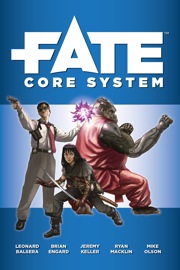TL;DR
Overall, Fate Core is an interesting system that I look forward to trying out. The book itself is a high quality product. The only caveat is that the system caters primarily to story-oriented players at the expense of other play styles. If that's not a problem for you and your group, then give it a shot.
The Full Review
I backed this on Kickstarter, and received my copy 2 days ago. I haven't yet had an opportunity to actually play a Fate game, but I have finished reading the book and can give a brief overview of the system, the physical book, and some comments.
Brief System Overview
1) Dice Mechanics. Fate's core die mechanic uses "Fate dice". These are six-sided dice bearing two plus signs, two minus signs, and two blanks sides -- essentially, a d3. A plus gives you +1; blanks 0; minuses -1. Any activity that calls for a roll will be resolved by rolling four of these, totting them up, adding a skill modifier, and comparing the result with either a DC set by the GM, or an opposed roll by an NPC.
2) Fate Points. Players (and the GM) get a supply of Fate points. These can be spent in order to gain situational bonuses, such as gaining a +2 on a die roll, or declaring that you really do have a piece of suddenly important equipment. They can also be earned by accepting complications, resulting in an economy of Fate points that fluctuates over the course of play.
3) Abstract PCs. Compared to Pathfinder and other d20 systems, characters are very simple. Both systems have skills, and Fate "stunts" are basically equivalent to Pathfinder "feats". The similarity ends there. Fate characters do not have ability scores, armor classes, hit points, or classes. Instead of picking a class, you simply declare what kind of a character you want to play, and invent some appropriate "aspects" -- short phrases describing your character's key attributes. There is very little math involved, and much of the detail that goes into a Pathfinder character is handled entirely in the abstract.
4) No campaign setting. The system does not have a default campaign setting. It's designed to support any type of game world the group would like: fantasy, sci-fi, steampunk, western, asian, historical, or any other type of game you can dream up. In order to support such a vast array of campaign types, the system is designed to be modified on fly, encouraging people to reflavor skills, invent their own stunts (feats), and whatever else is necessary. There are also chapters on magic systems and such to aid you with that. If you don't feel like inventing your own world, you can always play a Fate game using any existing campaign setting -- even Golarion, if you feel like it.
There's a lot more of course, but those are the key take-aways.
The Book Itself
The book itself is a high quality product.
1) Visual Appeal. The art is all black-and-white (except the cover). But it's well-executed and plentiful.
2) Navigation. The table of contents and index are both pretty good. There are also marginal cross-references scattered throughout the text to make it easier to jump from one bit of rules to related passages.
3) Text. The writing is clear and accessible. I do wish there had been a glossary of game terms, as I often found myself flipping back to figure out what a "shift" or a "free invocation" was. But on the whole it was well-written.
There's plenty of white space left in for making notes. Evil Hat clearly paid a great deal of attention to detail in assembling this product.
Lastly, I would also like to point out that Evil Hat has made the entire text of this book available as a system reference document, under both OGL and Creative Commons (CC-BY) licenses. If you're on a tight budget, or just want to see what's there before taking the plunge, you can get the whole thing for free (minus the artwork). If you wind up playing a Fate game, a physical copy would still be a good investment.
Comments
The system as a whole is strongly focused on story. It's integrated at every level. You cannot even finish making a character without making backstory and tying it to the backstory of the other characters in your group.
For people who are good at story, that's awesome. You can make essentially any character concept work without bizarre multi-classing or similar. You just declare what you want, pick skills appropriately, maybe invent some stunts, and call it good.
For people who struggle with story, life in a Fate game will be difficult. And let's face it, it's pretty common to have at least one player in a group who is perfectly happy building mechanically complex characters, yet is totally at sea when asked "What's your name?" If that describes you, then Fate will likely be an uncomfortable fit at best.
Overall, it's an intriguing system that I look forward to trying out.
Addendum
I wrote this entire review twice. The first attempt got swallowed by Paizo's site without actually getting posted, meaning I had to rewrite the WHOLE THING. Booo. There goes two hours of my day.





